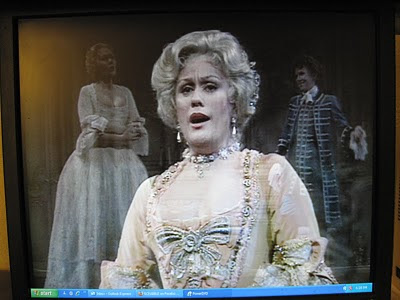
(This was one
mezzo's response to
Zucker's intimations about the sexual proclivities of mezzos)

(This is an example of the yellow cast to the footage)
So,
Opera Fanatic-- Not sure what to say about this, uh, "singular" documentary.
It chronicles an opera fanatic in his quest to find out what drove the "expressive" singing of opera divas from the 40s & 50s (that is, the divas of his childhood). He manages to get a number of interesting interviews with some very impressive, elegant, quirky, accomplished, and charismatic elderly ladies, and these are juxtaposed with footage of them singing in their heyday. So, that was pretty good.
However, the fanatic himself, Stefan
Zucker is really kind of problematic. His voice is almost impossible to get past, and he is the slowest speaker I have ever heard. His fanaticism with opera seems linked to some oedipal issues (his mother and he both were opera singers, and sung many duets together. He said that none of the women he loved as an adult had the emotional range that his mother had) (Also worth mentioning,
Zucker achieved the world's record for highest tenor).
Furthermore, his weird sexuality seeps into the film in an unpleasant way. He informs the
filmmakers while they are in the car on the way to interview a famous mezzo-soprano, that mezzos are known for their sexual proclivities. To quote: "To judge from accounts of singers I've interviewed, they enjoy kinds of intercourse other women might find painful." (I placed a picture above of the
mezzo's retort to this suggestion.). He also tells one woman he interviewed that he felt "an erotic intensity" to her "emanations". Yuck.
Also the film quality was pretty poor. Much footage had a yellow cast to it, and most of it seemed grainy. Not only that, but there were entire chunks of dialogue that weren't subtitled.
Here's what one
Netflix reviewer wrote:
"The bad color is surely an accident of inept filming, but the rest reflects the character of interviewer Stefan
Zucker, a bloated, simpering prig with tunnel vision about singing technique. The first offense is that
Zucker speaks, at all times, in an affected falsetto that is torture to hear. It's a wonder he isn't beaten to a pulp by everyone he dares to address. The second is that he omits any overview of each diva's professional accomplishments during a bygone era and instead hounds them all with the same two questions about the nature of "expressive singing" and the utility of "the chest voice." He writhes appallingly to encourage one diva's twisted wisecrack about a "spanking," gushes that he finds another interview "erotic," and otherwise tries to worm his way into their confidences through flattery and little gifts that they complain about having to accept ("What shall I do with THESE?"). Marcella
Pobbe finally gives him a much needed verbal whack by refusing to go along with his "stupid questions," which is probably the highlight of this otherwise unbearable film."
 I just read John E. Sarno's The Mindbody Prescription: Healing the Body, Healing the Pain. I read it in one sitting.
I just read John E. Sarno's The Mindbody Prescription: Healing the Body, Healing the Pain. I read it in one sitting.













































